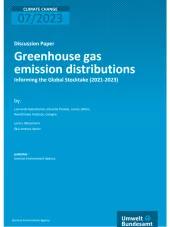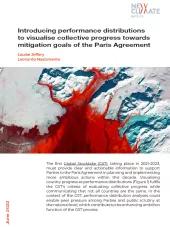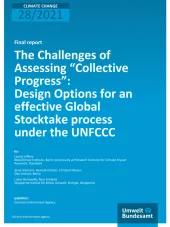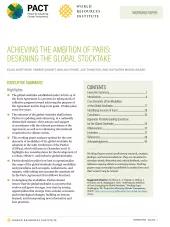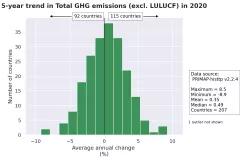The aim of the Global Stocktake under the Paris Agreement is to assess the collective progress of Parties towards achieving the purpose of the Agreement and its long-term goals. The outputs of the Global Stocktake are key in informing Parties in updating and enhancing their actions and support, as well as in enhancing international cooperation for climate action.
In the thematic area of mitigation, the actions which have been implemented and put forward by Parties in their Nationally Determined Contributions (NDCs) are collectively highly insufficient to keep the temperature goal of the Paris Agreement within reach. Hence, it will be key for the Global Stocktake to formulate clear messages on increasing mitigation actions. These messages should be concise, name key actions and targets, and inform Parties in updating and enhancing their actions.
The cover decisions of the climate change conferences in 2021 and 2022 already contained some specific language on increasing action and support. In the area of mitigation, these cover decisions addressed, inter alia, collective progress, the need for accelerated action, energy systems, non-CO2 emissions and ecosystems. The outputs of the Global Stocktake should go beyond the language of previous years and contain additional actions and sectors. Based on available literature on mitigation actions and their potential, the following key mitigation actions are suggested to be included in the outputs of the Global Stocktake:
- Boost wind and solar electricity supply
- Increase energy efficiency and sufficiency
- Phase out fossil fuels
- Phase out fossil fuel subsidies while enabling a just transition
- Electrify the vehicle fleet and facilitate a shift in transportation modes
- Improve efficiency and shift towards renewable energy in the buildings sector
- Decarbonize industrial production
- Circular material flows
- Reduce methane emissions from fossil fuels, agriculture and waste
- Stop deforestation and maximise removals on land
- Sustainable food systems
These mitigation actions should be complemented by specific targets, both quantitative and qualitative. Depending on national circumstances, Parties may decide not to pursue all mitigation actions, and they may take additional actions. When implementing these mitigation actions, their social and economic consequences and impacts need to be taken into account and negative impacts minimised.
The proposed mitigation actions and targets could be included as key messages in the cover decision of the Conference of the Parties serving as the meeting of the Parties to the Paris Agreement (CMA). Targets could also be included in declarations as part of the Global Stocktake outputs. Finally, additional information on key mitigation actions could be provided in a technical annex. The messages on mitigation need to address both the time horizon until 2030 and the time horizon of new NDCs, which is 2035, keeping in mind the findings of the Intergovernmental Panel on Climate Change (IPCC) that greenhouse gas emissions need to be reduced by 43% and 60% compared to 2019 by 2030 and 2035, respectively.
The Global Stocktake should also provide guidance for Parties on how to incorporate its outputs into their next NDCs. Parties will need to assess the feasibility of actions, consider additional actions and assess impacts, barriers and enablers. As targets, rather than actions, constitute the key information in NDCs, Parties should in a next step set such targets. These should be achievable with the selected actions and in line with the long-term goals of the Paris Agreement. In a next step, Parties should plan their mitigation actions, ensure that they are aligned with long-term strategies and goals, and address finance flows and international cooperation. Finally, Parties should update their current NDCs with updated targets, communicate new NDCs with new targets and implement the mitigation actions.
When Parties report on progress in implementing and achieving their NDCs, they could include indicators for the various key targets. This would help tracking the collective progress towards these targets.


